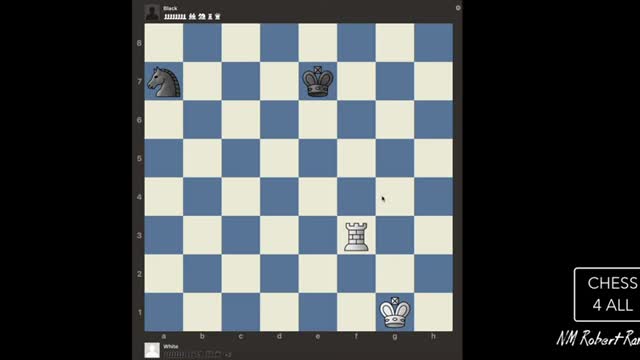Premium Only Content

Chess Lesson # 4: Check & Checkmate | How to play Chess the right way
Chess 4 All: Learn how to play Chess the right way from beginner to master level. National Master Robert Ramirez will take you up the pyramid by following a proven Chess training program he has been improving and implementing for over 10 years.
Continue learning the basics of Chess with National Master Robert Ramirez. In this video you will learn how the Chess pieces move, which will take you one step closer to playing your first Chess game.
00:14 Check is when one of the kings is in danger. If a piece is attacking its opponent's king, then that king is in check. It is customary to say "check out loud" to indicate your opponent's king is in trouble.
05:14 Checkmate is when a king is in check and it cannot escape it. In this case, the game is over and the player who delivered checkmate is the winner.
*Kings cannot put themselves in check.
You can practice and play Chess by getting a board at a reduced cost : click here ►► https://amzn.to/35e1lyM
Benefits of Playing Chess:
- Promotes brain growth
- Increases problem-solving skills
- It exercises both sides of the brain
- Raises your IQ
- Sparks your creativity
- Teaches planning and foresight
- Teaches patience and concentration
- Optimizes memory improvement
- Improves recovery from stroke or disability
- Helps treat ADHD
Chess is an intellectual battle where players are exposed to numerous mental processes such as analysis, attention to detail, synthesis, concentration, planning and foresight. Psychological factors are also present on and off the board; playing Chess stimulates our imagination and creativity. Every single move a player makes is the result of a deep analysis based on the elements presented on the battle field.
Chess in its essence teaches us psychological, sociological and even moral values. In a Chess game, both players start with the same amount of material and time. The fact that the white pieces move first is considered to be practically irrelevant —especially because a player typically plays one game as white and one game as black. Consequently, the final result of the battle solely depends on each player. It doesn’t matter if you win by taking advantage of your opponent’s mistakes or by simply avoiding mistakes yourself. Truth is that Chess is an extremely individual sport and our defeats can only be blamed on ourselves and no one else. And this, in the end, only benefits us because we learn to be and feel responsible for our actions and never come up with excuses to justify ourselves.
We also learn that when it comes to our victories on the board, our opponent's mistakes play a more significant role than our own skills. Let’s not forget that a Chess game without any mistakes would be a draw. This way, Chess provides us with another valuable life lesson: be humble at all times.
-
 38:29
38:29
The Guitar Fam
2 years ago $0.01 earnedHow to Play Shallow - Fingerstyle Guitar Lesson
3242 -
 LIVE
LIVE
Sarah Westall
2 hours agoDying to Be Thin: Ozempic & Obesity, Shedding Massive Weight Safely Using GLP-1 Receptors, Dr. Kazer
625 watching -
 LIVE
LIVE
LFA TV
23 hours agoThe Resistance Is Gone | Trumpet Daily 12.26.24 7PM EST
437 watching -
 LIVE
LIVE
theDaily302
11 hours agoThe Daily 302- Tim Ballard
517 watching -
 13:22
13:22
Stephen Gardner
5 hours ago🔥You'll NEVER Believe what Trump wants NOW!!
60.8K154 -
 54:56
54:56
Digital Social Hour
1 day ago $7.51 earnedDOGE, Deep State, Drones & Charlie Kirk | Donald Trump Jr.
29.2K1 -
 DVR
DVR
The Trish Regan Show
6 hours agoTrump‘s FCC Targets Disney CEO Bob Iger Over ABC News Alleged Misconduct
31.8K31 -
 1:48:19
1:48:19
The Quartering
7 hours agoElon Calls White People Dumb, Vivek Calls American's Lazy & Why Modern Christmas Movies Suck!
120K88 -
 2:08:42
2:08:42
The Dilley Show
8 hours ago $32.37 earnedH1B Visa Debate, Culture and More! w/Author Brenden Dilley 12/26/2024
108K24 -
 4:55:59
4:55:59
LumpyPotatoX2
10 hours agoThirsty Thursday on BOX Day - #RumbleGaming
104K5